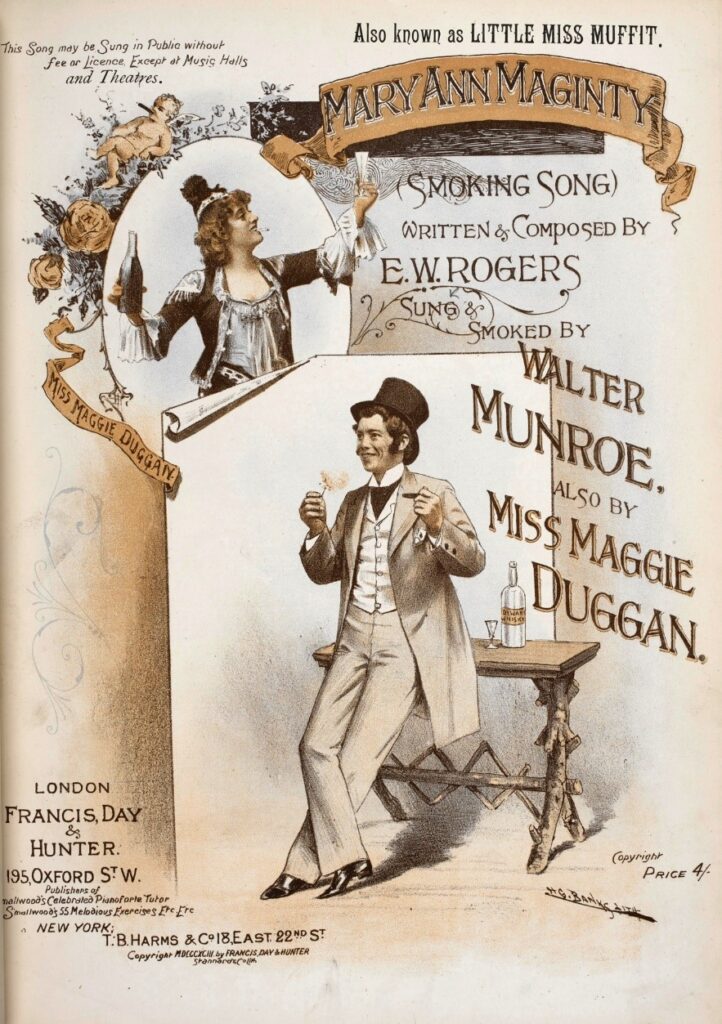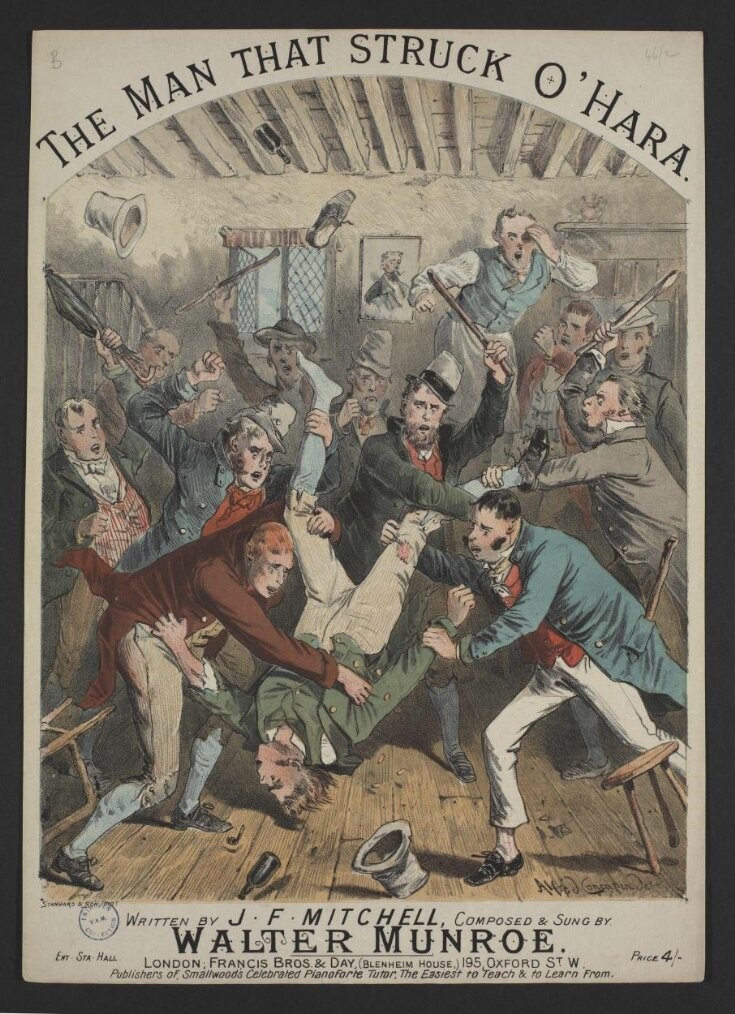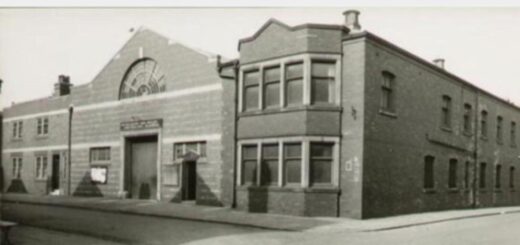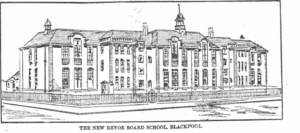Walter Munroe
Born Ballinasloe Co Galway 1856. Died Blackpool Aug 22 1914
The compilation of his life could not have completed without the help and interaction of Peter Charlton of the British Music Hall Society.
Joseph Jowett Walter Walker was born in Ballinasloe County Galway, his father reportedly being a Doctor of Music. Working back from his stated age at his death, he was born in 1856 and in a cheekily humorous claim in a newspaper theatre promotion he gives his birthday as 4th December. Known eventually by the stage name Walter Munroe, he became an established and popular dancer and comedian on the music hall stage.
His early journey to a successful career on the stage is not known but he is found by reference as working at Day’s Concert Hall in Birmingham where at first he looked after the horses and began performing as bareback rider and even trapeze artist before developing a talent as a singing clown.
Day’s Concert Hall was bought up by the Moss Empire, refurbished with Frank Matcham as the architect, but its sad demise was during the blitzes of WW2. Blackpool’s Frank Matcham designed Grand Theatre escaped such destruction as in both world wars the town was a safe haven and not targeted by enemy bombing.
It seems that Walter (it is not known when he acquired his stage name of Walter Munroe, and it was confusing at first when researching the name only to find that there were at least two Walter Munroes on the theatre circuits.) But by 1898, however his stage name was conceived, it had evidently become an annoyance and Walter the Irish comedian wanted to be disassociated from the other. The ‘other’ Walter Munro was a stage manager and agent who married Emma Don, part of a singing sister group and who eventually went on her own.
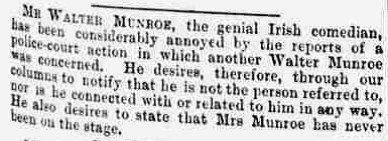
Walter first appears as Walter on the stage in his own right in the later 1870’s. In 1876 he is billed only as singer and comedian and not yet a dancer. His notable skills and dancing with specific skills as a top boot dancer developed later and, to this effect by 1898, at Deacon’s in Clerkenwell, and having by now achieved great popularity on the London Music Hall stage, a highlight could perhaps be understood when he was in a dancing match with Dan Leno, when Dan Leno was in clogs and Walter was in Hessian Boots.
A first advertised performance in his home country of Ireland appears to be at the Alhambra Music Hall Belfast in March of 1879 where in the Belfast News Letter, it was insinuated that a good reputation had already been established.
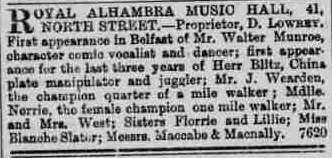
His popular music hall act was, in some perhaps highbrow circles, considered low comedy but he was renowned for several songs rising to become a favourite of the West End. There were many specifically Irish comedians, a genre which seemed quite popular on the stage. His characters included the ‘ludicrous’ ‘Fitzpatrick’, the ‘Doctor of the Regiment’, ‘Viscount Barney Blake’ and the ‘Lancashire Lad’. He was renowned for singing seven songs, complete with energetic dancing, where most artists would struggle to get to five in their act.
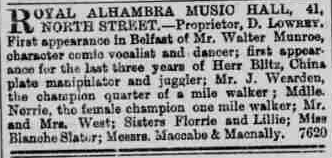
He was particularly popular in the East End and in 1896 he was a success in the pantomime entitled the Picnic in Turkey with a theme that expressed the triumph over oppression which the audience might have latched onto well in their socio economic, yet patriotic status. His songs here are described as a compliment to both the librettist and the composer as ‘Walter of the happy face and full, resonant voice reaches the furthermost recesses of the gallery at the big Mile End theatre of varieties.’ (The Era of December 19th).
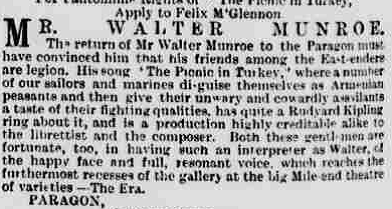
In 1895 he is described in the Stage as ‘the prince of Irish comic singers and one of the best-humoured, funniest drolls on the variety stage’. As well as being popular at the London theatres he had many friends in the provinces too. In 1893 playing the Newport Empire and as reported in the ‘Stage’, ‘a most entertaining programme is provided this week, first and foremost being Walter Munroe, who seems to be quite unable to satisfy his hearers. The more he sings the more the audiences want him to sing.’ He was a favourite of the Newcastle audiences where in 1914, on the news of his death, the demise of the genre of the Irish comedian exemplified by Walter Munroe was regretted and referred back to the older audiences who knew him in his prime some twenty years since, as Music Hall itself was now passed its prime.
In 1905 at the Preston Hippodrome, ‘that old favourite with a Preston audience, Walter Munroe, is as bright and entertaining as ever.’ And in 1913, ‘Walter Munroe, a good old favourite all over the kingdom, and an especially welcome visitor to Preston, will present some of the latest of his scoring numbers as an Irish character comedian and dancer.’ Preston Herald
The Evening Herald of Dublin in August of 1907 describes him as a ‘comedian who has an inimitable knack of tickling the public fancy’.
At the Palace, Blackpool in 1909, ‘it is refreshing these days to come across a real good Irish comedian, and the Palace patrons have this advantage this week, for Walter Munroe has established himself a favourite comedian and dancer’. And again at the Palace in Blackpool in 1913, ‘Walter Munroe in his latest successes, “Levinski’s St Patrick’s Day” and that beautiful Irish song “Father Mac”.’ (both articles from the Fleetwood Chronicle.)
By now picture shows were popular in the theatres heralding the eventual decline of Music Hall.
During the war in South Africa patriotic songs blossomed on the stage and Walter was no exception with, ‘When The Boys Come Home Again’. It would be interesting to note how he might have reprised that patriotism in WW1 with his Irish nationality, putting his profession in conflict with the events of 1916 in Dublin, though his death at the outbreak of the war prevented that chance and patriotic songs were left to artistes like Blackpool’s own Victoria Monks and Vesta Tilley, also with her strong Blackpool connections. Not all celebrities can get way without controversy of one kind or another and in 1892 at the height of his popularity he was able to clear his name from being accused of stealing a diamond pin worth £50 (£6,496.63) from a jeweller at Margate, and he was awarded £15 (£1,948.99) damages.
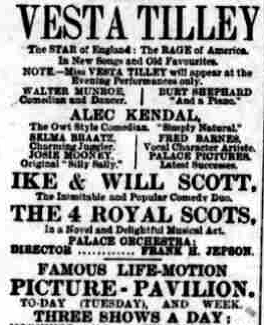
Joseph married Lucy Charnley, in Nuneaton 1903. Lucy was a young singer on the stage in a double act with her sister Annie, and billed, quite understandably, as the Charnley Sisters. Occasionally attired in brilliant costumes, are very energetic, they were comediennes, high kickers and duettists and included singing, dancing, baton throwing, skirt dancing and clog dancing. They are also described as burlesque artistes and dancers.Singing sisters were a popular genre on the stage of the time and the Charnley Sisters played to good reviews and their songs included, ‘She was one of the Highty Flighty Girls’ and ’Ginger Loo’. ‘Cheer Up Mother’ is an example of a patriotic song). In 1906 in Folkestone ‘their numbers are up to date and catchy and include the nautical ditty,’ Same Girl’ and The ‘Military Maid’, and introduce some skilful baton swinging’ (Folkestone Herald
He died on August 24th 1914 at his residence at 107 Peter Street aged 58 and had been in the town since February. He had been to Blackpool several times during his career and had come to Blackpool for health reasons and had recently performed at the Palace theatre, though it seems he had already generally retired through ill health. The funeral was Thursday 27th August and he was buried at Layton cemetery. He left his estate of £214.14 (£25,252.00 in 2020) to his wife Lucy.
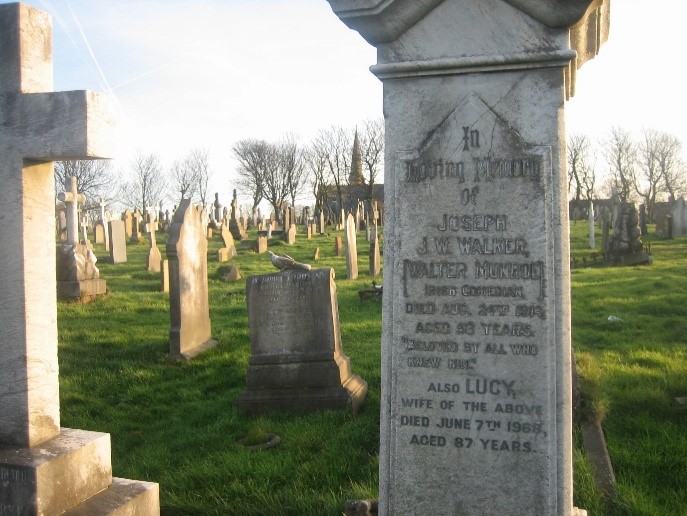
Sources and acknowledgements
While much of the information has come from the newspapers, the generous help from Peter Charlton of the British Music Hall Society has been considerable.
Newspaper image © The British Library Board. All rights reserved. With thanks to The British Newspaper Archive (www.britishnewspaperarchive.co.uk). Accessed via findmypast.
https://www.bankofengland.co.uk/monetary-policy/inflation/inflation-calculator
His most noted song would credit any anti-bullying idea throughout human history though its portrayal of the lust for violence in reprisal perhaps might be considered somewhat extreme. Thanks to the website quoted below for the words and the website quoted above for the image.
The Man That Struck O’Hara.
Last night to Dan O’Hara’s house a lot of good boys went,
We had a splendid supper, and a pleasant time we spent-
But in every company there’s a fool who makes a lot of fuss,
And upsets all the harmony-’twas just the same with us.
Chorus.
First we mopped the floor with him, dragged him up and down the stairs.
Then we had another go under tables, over chairs;
Such a sight you never saw-before he’d time to say his prayers.
Rags and bones were all we left of the man that struck O’Hara.
You never saw such value, boys, there never was such fun,
He wanted to apologize before we’d half begun;
We wanted no apology, for that would do no good,
But to wipe out that gross insult, we meant to have his blood.- Chorus.
At first we played with him, like a cat will with a mouse,
We chased him in the corners, and, in fact, all ’round the house;
He shouted, mercy and police, it’s time that you were done!
But when he shouted murder! oh, ’twas then we had the fun.-Chorus.
http://www.traditionalmusic.co.uk/songster/20-the-man-that-struck-ohara.htm
Sources and acknowledgements
Thanks to Peter Charlton of the British Music Hall society for help ad prompts.
https://www.bankofengland.co.uk/monetary-policy/inflation/inflation-calculator Newspaper image © The British Library Board. All rights reserved. With thanks to The British Newspaper Archive (www.britishnewspaperarchive.co.uk


